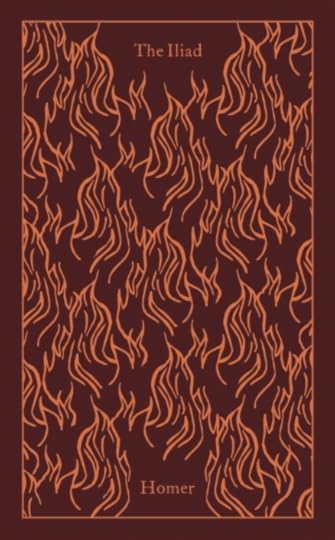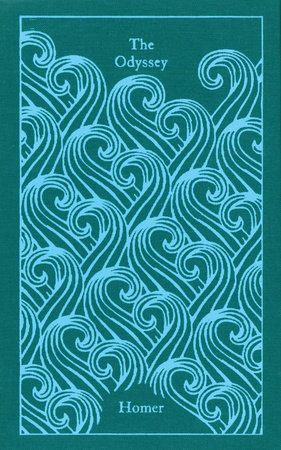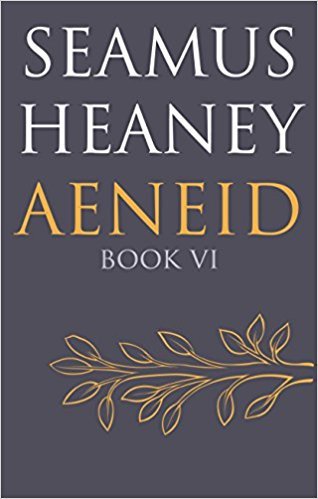The sincerest form of flattery
As you might have noticed, I've been reading a lot of epic poetry recently (as part of my work for uni), and thinking about different translations and adaptations of classical epics. Here are my thoughts on a few I've read over the past week or so (although, as ever, there are many more on my to-read list):
The Iliad and the Odyssey translated by E.V. Rieu


Rieu's translations of Homer were the first that I read, so I'll admit that I'm slightly biased, but I would still recommend this pair (which I own as a gorgeous, matching set in Penguin 1961 editions) for first-time readers of Homer, and I also still use them as my go-to translations. Given the timelessness of Homer's poems, Rieu's translations have dated well, and they are extremely useful in their literal approach. There is also something about the crisp, prose (yes, prose) style that I just savour. I was also pleasantly surprised, when I first read the Iliad and Odyssey (in English), by how readable they are, and that ease of reading definitely owed something to Rieu.
The Odyssey translated by Emily Wilson

For those who don't know, Emily Wilson is the first woman to translate the Odyssey (in its entirety) into English. And I think that is somehow both important and irrelevant. Unlike Rieu's prose, Wilson has opted for a more traditional approach using the same number of iambic pentameter lines as there are hexameters in the original, and while this has been criticised by some, I think it is a sensible choice. As anyone who follows me on Twitter will know, I am obssessed with the opening line of Wilson's translated: "Tell me about a complicated man." Overall, Wilson's translation is more or less what one might expect, striking a good balance between contemporary and traditional, although I did feel that some of her repeated set translations (especially epithets and the like) didn't always quite strike the right balance between literal and idiomatic. I would highly recommend Wilson's Odyssey, although there is something about it that made me think it is best enjoyed by someone already familiar with the text. Feel free to disagree. (Emily Wilson is also absolutely worth following on Twitter.)
Memorial: an Excavation of the Iliad by Alice Oswald

This is such a raw, beautiful, and powerful piece of poetry. It opens with a stark list of the names of the dead from the Iliad, which looks strikingly like a modern war memorial. Even turning the pages of this list is powerful stuff. Memorial made me realise how easy it is to become numb to most of the deaths in the Iliad, their volume their and brutality, and even to celebrate in some of them alongside the hero doing the killing. Oswald doesn't let her reader get away with that, nor does she take sides in the war, as she follows this stark list with an account, some longer than others as her source text dictates, of each character and their death. Fans of Oswald's poetry won't be disappointed by her stunning language, which really is intended to be read aloud (much as Homer was), coupled with translations of Homeric similes, and some subtle contemporary references. I think what really broke me, though, was her masterful use of repetition. This is truly heartbreaking stuff. (Don't make the mistake of reading it in a coffee shop, like I did.)
War Music by Christopher Logue

This is just incredible. Logue used multiple translations of the Iliad to create an adaptation of Homer's epic - this is by no means a translation. I don't even know where to begin with this one. Just read it. War Music is full of the most brilliant contemporary language and references, which are often wryly humorous, as well as vivid, graphic imagery, sometimes harsh, sometimes almost cartoonish. He plays with language, mimicking the sounds of Homer's Greek, as well as structure, tense, voice, and even font. Logue is doing something very different here, and I think it is definitely worth seeing.
Aeneid VI translated by Seamus Heaney

Heaney explains, in the introduction, that he chose Book VI to translate because his old Latin teacher could not help but pass on his love of this book to his students, even though they had been set Aeneid IX for their A Levels. I personally think it's an unusual choice of book, but each to their own. When I first read Heaney's Aeneid VI, I was a little disappointed, perhaps because I had wanted to read it for so long. Having thought about it, however, I think that what Heaney doesn't do is anything particularly flashy or radical, but what he does do it capture the spirit of the poem. Heaney's translation isn't mind-blowing in the same way that Logue's War Music is, but, on reflection, it feels remarkably like Vergil - and that's no mean feat. I particularly liked the way Heaney coupled iambic pentameter with Old English alliterative rhythms. Don't underestimate the humility of this one.
As an (related) aside, I also watched Troy (2004) at the weekend for the first time. It made me irrationally angry. Don't do it to yourself.
What did you think of these translations and adaptations? And what epic poetry would you recommend I bump up my to-read list? Let me know, either via Goodreads or Twitter!
The Iliad and the Odyssey translated by E.V. Rieu


Rieu's translations of Homer were the first that I read, so I'll admit that I'm slightly biased, but I would still recommend this pair (which I own as a gorgeous, matching set in Penguin 1961 editions) for first-time readers of Homer, and I also still use them as my go-to translations. Given the timelessness of Homer's poems, Rieu's translations have dated well, and they are extremely useful in their literal approach. There is also something about the crisp, prose (yes, prose) style that I just savour. I was also pleasantly surprised, when I first read the Iliad and Odyssey (in English), by how readable they are, and that ease of reading definitely owed something to Rieu.
The Odyssey translated by Emily Wilson

For those who don't know, Emily Wilson is the first woman to translate the Odyssey (in its entirety) into English. And I think that is somehow both important and irrelevant. Unlike Rieu's prose, Wilson has opted for a more traditional approach using the same number of iambic pentameter lines as there are hexameters in the original, and while this has been criticised by some, I think it is a sensible choice. As anyone who follows me on Twitter will know, I am obssessed with the opening line of Wilson's translated: "Tell me about a complicated man." Overall, Wilson's translation is more or less what one might expect, striking a good balance between contemporary and traditional, although I did feel that some of her repeated set translations (especially epithets and the like) didn't always quite strike the right balance between literal and idiomatic. I would highly recommend Wilson's Odyssey, although there is something about it that made me think it is best enjoyed by someone already familiar with the text. Feel free to disagree. (Emily Wilson is also absolutely worth following on Twitter.)
Memorial: an Excavation of the Iliad by Alice Oswald

This is such a raw, beautiful, and powerful piece of poetry. It opens with a stark list of the names of the dead from the Iliad, which looks strikingly like a modern war memorial. Even turning the pages of this list is powerful stuff. Memorial made me realise how easy it is to become numb to most of the deaths in the Iliad, their volume their and brutality, and even to celebrate in some of them alongside the hero doing the killing. Oswald doesn't let her reader get away with that, nor does she take sides in the war, as she follows this stark list with an account, some longer than others as her source text dictates, of each character and their death. Fans of Oswald's poetry won't be disappointed by her stunning language, which really is intended to be read aloud (much as Homer was), coupled with translations of Homeric similes, and some subtle contemporary references. I think what really broke me, though, was her masterful use of repetition. This is truly heartbreaking stuff. (Don't make the mistake of reading it in a coffee shop, like I did.)
War Music by Christopher Logue

This is just incredible. Logue used multiple translations of the Iliad to create an adaptation of Homer's epic - this is by no means a translation. I don't even know where to begin with this one. Just read it. War Music is full of the most brilliant contemporary language and references, which are often wryly humorous, as well as vivid, graphic imagery, sometimes harsh, sometimes almost cartoonish. He plays with language, mimicking the sounds of Homer's Greek, as well as structure, tense, voice, and even font. Logue is doing something very different here, and I think it is definitely worth seeing.
Aeneid VI translated by Seamus Heaney

Heaney explains, in the introduction, that he chose Book VI to translate because his old Latin teacher could not help but pass on his love of this book to his students, even though they had been set Aeneid IX for their A Levels. I personally think it's an unusual choice of book, but each to their own. When I first read Heaney's Aeneid VI, I was a little disappointed, perhaps because I had wanted to read it for so long. Having thought about it, however, I think that what Heaney doesn't do is anything particularly flashy or radical, but what he does do it capture the spirit of the poem. Heaney's translation isn't mind-blowing in the same way that Logue's War Music is, but, on reflection, it feels remarkably like Vergil - and that's no mean feat. I particularly liked the way Heaney coupled iambic pentameter with Old English alliterative rhythms. Don't underestimate the humility of this one.
As an (related) aside, I also watched Troy (2004) at the weekend for the first time. It made me irrationally angry. Don't do it to yourself.
What did you think of these translations and adaptations? And what epic poetry would you recommend I bump up my to-read list? Let me know, either via Goodreads or Twitter!
Published on May 15, 2018 15:06
No comments have been added yet.



